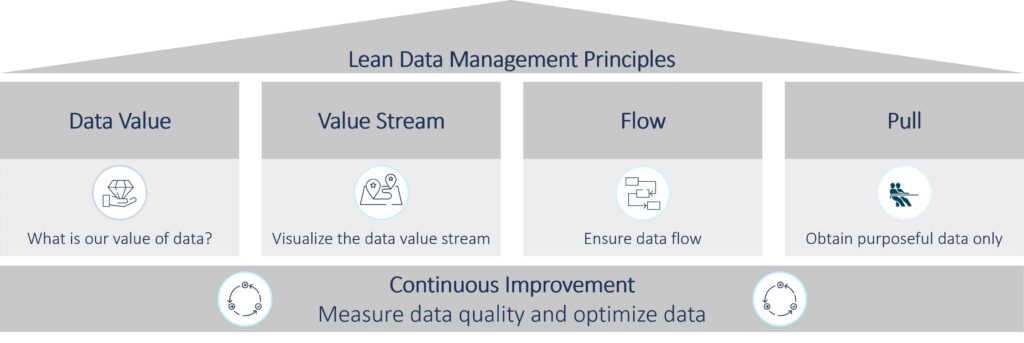
The Power of Automation in Data Migration
Automation is a practical solution to speed up and optimize the entire data migration process

Going through a digitalization initiative can be a challenging task. Where do we start, and which rules should we follow to get as much value out of our data as possible? This article aims to provide guidance and should enable organizations to optimize data and processes by following lean data management principles.
In a fast-paced and increasingly digital world, any company must be as efficient as possible. Companies need to optimize their business processes, reduce operating costs, and use resources effectively so that they can focus on activities that create added value. Businesses also need to make accurate and informed decisions that are built on reliable data. Regulations are necessary for governing how data should be collected, stored, and used. However, companies must be able to respond to changing business needs and market conditions, ensuring flexibility and adaptability.
But how can those issues be tackled?
Following Lean Data Management principles can be an effective approach to resolving those challenges. To better understand the term Lean Data Management, we will look at the evolution of production.
Originating back to the revolution of the production system, Toyota was the first company to utilize a lean manufacturing approach. This methodology focuses on minimizing waste while maximizing efficiency and value. Lean principles like continuous improvement, just-in-time production, and respect for people improved their quality, reduced their inventory, and increased flexibility. Consequently, people’s mindset has changed to a focus on value, streamlining processes, empowering employees to identify/solve problems, and delivering customer-centric value (Lean Thinking). Combining lean manufacturing approaches with a lean mindset is called Lean Management.
Lean Data Management refers to combining Lean and Data Management. Thus, common lean principles are merged with general data management procedures. At Camelot, we consequently consider those lean principles when defining the end-to-end approach to data (e.g., master data) addressing its processes, organization, people, and technology. Consequently, the following Lean Data Management Principles can be derived:

Data Value
The first step in establishing a data-driven company culture is to define which data is valuable to the organization and critical to supporting and safeguarding all key business processes. Furthermore, data management practices must be aligned with organizational goals. Implementing and following clear guidelines, policies, and procedures for managing data assets should directly contribute to reaching the company’s overall objectives.
Value Stream
From collection and storage to analysis and disposal – understanding and efficiently managing data throughout its lifecycle is crucial to prevent data accumulation and storage of irrelevant or obsolete data. A first step to better understanding the data lifecycle can be to visualize the data value stream through a critical path. Consequently, the company will be able to improve and effectively manage corresponding business processes.
Flow
The company should ensure that data flows efficiently through processes, minimizing delays and handoffs. The organization should also implement automation tools and processes to handle routine data management tasks to reduce manual intervention and human error. In minimizing redundant efforts, unnecessary data duplication, and inefficient use of resources, the company can optimize resource utilization. The motto is: Keep it simple. Striving for simplicity reduces complexity, making it easier to manage and work with data.
Pull
The right data needs to be at the right place at the right time. The organization should ensure to establish processes that data is requested and used only when needed, reducing the effort for unnecessary data storage and mitigating inefficiencies. Data should be easily accessible to those who need it for analysis, reporting, and decision-making while maintaining proper security measures.
Continuous Improvement
The company should continuously analyze data management processes, identify areas for improvement, and implement changes to increase efficiency and reduce waste. Hence, it is relevant to establish KPIs to measure data quality. High-quality, well-organized data enables more accurate and informed decision-making.
Following a Lean Data Management approach encourages companies to develop a data-driven culture, where employees recognize the value of data and use it to support their daily business. It further ensures that decision-makers can access reliable data when needed. Lean Data Management promotes flexibility and adaptability, making it easier for organizations to respond to changing business needs and market conditions.
Thus, organizations efficiently managing and leveraging their data in alignment with their overall objectives gain a competitive edge over their competitors.
At Camelot, following the above principles is a common practice in various customer projects. Working either in hybrid project methodologies or even full-scope SAFe frameworks, we always commit to lean data principles to ensure effectiveness and efficiency while being able to adapt to changing customers’ needs (customer-centricity approach).
To conclude, Lean Data Management and its principles help organizations harness the power of data while minimizing waste and inefficiencies, leading to improved processes, performance, and better outcomes. If you want to learn more about this topic, please reach out to us.

Automation is a practical solution to speed up and optimize the entire data migration process

Discover how you can streamline your financial master data management and reengineer financial processes with SAP MDG Finance.

Whilst it seems straightforward to carry out either a blood transfusion or a data migration, the actuality proves far more complex.

In this blog article, Camelot introduces you to the main principals of Demand-Driven Supply Chain Management.